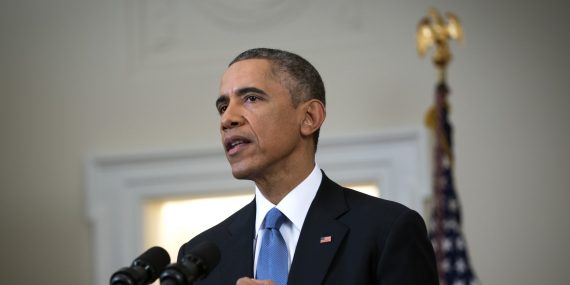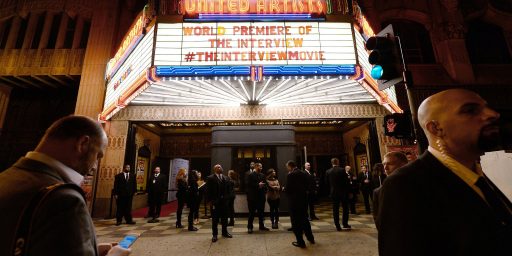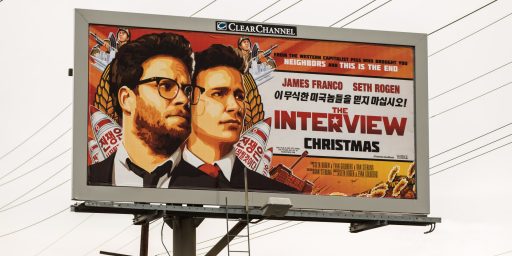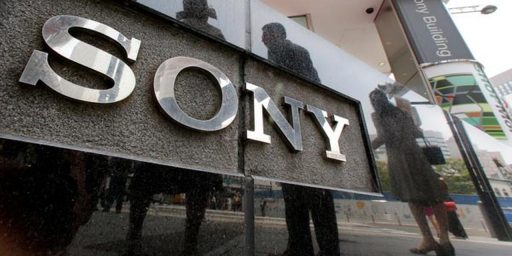Obama Faults Sony For Pulling ‘The Interview’ From Theaters, Vows Response To North Korea
President Obama criticized Sony for backing down, and said that the U.S. would respond to North Korea's cyber attack "at a place and time we choose,"
As expected, the very first question that President Obama got at his end-of-the-year press conference today was about the news that the F.B.I. had determined that North Korea was behind the hacking attack against Sony Pictures, and in answering the question the President both vowed that there would be a response to what North Korea has done and criticized Sony for pulling the movie:
WASHINGTON — President Obama on Friday said that the United States “will respond proportionally” against North Korea for its cyberattacks on Sony Pictures, and criticized the studio for giving in to intimidation and pulling the satirical movie that provoked the attacks.
Mr. Obama said the response would come “at a place and time we choose,” but declined to be more specific about what it would be. He said that “we have been working out the range of options that will be presented to me.”
His threat came just hours after the F.B.I. said it had extensive evidence that the North Korean government organized the cyberattack that debilitated the Sony computers, marking the first time the United States has explicitly accused the leaders of a foreign nation of deliberately damaging American targets.
Sony this week dropped its plans for the release of “The Interview,” a movie that depicts the assassination of the North Korean leader, Kim Jong-un, after threats were made against the theater companies that intended to show it.
In criticizing Sony’s leadership for withdrawing the film, Mr. Obama argued that the precedent it set could be damaging — and that the United States could not give in to intimidation. He said that it would encourage other countries to sabotage documentaries, “or news reports they don’t like.”
Mr. Obama did not pass up the opportunity to take a jab at the insecure North Korean government for worrying about a Hollywood comedy, even a crude one.
“I think it says something about North Korea that it decided to mount an all-out attack about a satirical movie starring Seth Rogen,” he said, smiling briefly at the ridiculousness of an international confrontation being set off by a Hollywood creation.
More from CNN:
Washington (CNN) — President Barack Obama on Friday said that Sony Pictures made a mistake in canceling the release of a movie after a cyberattack from North Korean-backed hackers.
“I am sympathetic to the concerns that they face. Having said all that, yes, I think they made a mistake,” Obama said at a news conference Friday. “Let’s not get into that way of doing business.”
Obama’s statement came hours after the FBI announced North Korea is officially responsible for the cyberattack on Sony Pictures, an attack law enforcement officials called a “game changer.”
“We cannot have a society in which some dictators some place can start imposing censorship here in the united states because if somebody is able to intimidate us out of releasing a satirical movie. Imagine what they start doing once they see a documentary that they don’t like or news reports that they don’t like,” Obama said. “That’s now who we are. That’s not what America is about.”
Here’s the video of the question, and the President’s response:
The head of Sony Pictures, who ultimately made the decision to pull the movie after distributors declined to show it, pushed back on the idea that his company had made a mistake, or even that it had pulled the movie:
Sony Entertainment CEO Michael Lynton, denying that the studio had “caved” by scrapping next week’s opening of “The Interview,” fired back Friday after President Obama said the studio had “made a mistake.”
“The president, the press, and the public are mistaken as to what actually happened,” Lynton said in an exclusive interview with CNN’s Fareed Zakaria. “We do not own movie theaters. We cannot determine whether or not a movie will be played in movie theaters.”
Lynton said he would be “fibbing” to say he “wasn’t disappointed” in Obama’s remarks.
“I don’t know exactly whether he understands the sequence of events that led up to the movie not being shown in the movie theaters,” Lynton said. “Therefore I would disagree with the notion that it was a mistake.”
(…)
In Friday’s CNN interview, Lynton went on to say that Sony had not “caved” to the hackers.
“We have not given in. And we have not backed down. We have always had every desire to have the American public see this movie,” Lynton said.
Lynton’s response, of course, is largely based on the fact that Sony’s decision to cancel the premier was basically a fait accompli once the major film distributors and theater chains had decided, independent of Sony itself, that they would not be showing the picture regardless of what decision Sony itself made. Left with that fact, which essentially meant that there would be nowhere to show the film with the possible exception of a handful of independent theaters, Sony really had no other choice but to pull the movie. In theory at least, this doesn’t have to be a permanent decision. Sony could end up working out deals with the theaters to get the movie back in on a limited and low-key basis, at least for a limited period of time, it could just go ahead and release the movie on DVD and make it available in On Demand and streaming formats, or it could make the film available essentially for free at some point in the future. Given the fact that projections indicate that the studio has already spent some $40 million on the movie and stood to lost millions more because of its decision, there’s no doubt that they would probably like to release it at some point in the future. However, given the fact that it was reported earlier today that the hackers behind the attacks have promised additional attacks if Sony does anything to make the film available anywhere in any format at any time, the company would still be taking some kind of risk if it did what Layton says the company wants to do. For the time being, then, it is simply not true for Layton to say that the company had not “caved” to the hackers, because that is exactly what they have done and what they will continue to do as long as they keep the movie away from the public. I don’t necessarily fault Sony for making this decision, though. If they had released the movie and something had occurred that caused injury to others, it would have caused irreparable harm to the company that likely would not have been covered by any form of insurance at all. Additionally, as a I noted, once the big theater chains made their decision there really wasn’t much that the company could do, at least not for the time being.
That being said, I believe that President Obama has a point here that is worth considering. Giving in to a threat like this is only likely to encourage others to make similar threats in the future. What if some other rouge dictator is offended by a news report in The New York Times, or a documentary that shows the human rights abuses that their regime has engaged in? What if the next thing that sets the North Koreans off is the upcoming documentary from Amnesty International? Backing down in the face of threats, while an understandable reaction from risk averse businesses, only seems certain to guarantee that such events are more likely to happen. If the President made a mistake in his remarks, it was in limiting his criticism to Sony since as Lynton makes clear in his comments, it wasn’t just Sony’s decision that led to the cancellation of the December 25th premiere, but that doesn’t mean he is wrong in principle. What is at stake here, in the end is a principle about freedom of expression and the idea that there ought to be no idea that is forbidden from being expressed, even if it something that someone finds deeply offensive. Even more, self-censorship in the face of what amounts to terrorism in the cyber world, if not an act of war, accomplishes nothing but guaranteeing that it will happen again.
In an important sense, though, the ball is still in President Obama’s court. There obviously needs to be some response to what has happened here, and it needs to be one that is loud, clear, and emphatic. It should send a message not just against using the Internet as a means of covert war unless one wants to pay the price of retaliation, but also that we will not sacrifice our own principles to the demands of the rest of the world based on threats. What that the appropriate response might be is not an easy question, and I’m certain that the people who get paid to make those decision will be working overtime in the coming days and weeks notwithstanding the upcoming holidays, is well above my own pay grade, but I do know we’ve got to figure something out because otherwise this will happen again.





What I’ve found most interesting in the president’s various remarks on this subject is his use of the phrase “proportional response”. What would a proportional response be in this case?
Also, here and there I’ve seen criticism of the idea that the U. S. should retaliate against North Korea in some way because Sony Picture Entertainment is a private company. I don’t think that’s a very solid argument.
The estimates I’ve read of the costs of the entire hacking incident to Sony vary from $100 million to $500 million. Imagine for a moment that North Korean saboteurs had set a bomb in a Ford plant that did $100 million worth of damage. Is that not something we should retaliate against? In other words it’s the damage not the nature or target of the attack.
@Dave Schuler:
Sure, but a bomb going off in a big plant isn’t just going to cause massive financial loss, it’s going to cause massive loss of life, and people understandably–and justifiably–react a lot more sharply to that.
Be that as it may….what would be a proportional response in this case? You couldn’t make the lives of North Koreans much more miserable than they already are. And do they deserve it?
How do you find the hackers and punish them?
I dunno, I quite like Digby’s take on this:
But in truth, neither “America” nor “Hollywood” caved to the terrorist threat. Capitalism did. Sony is a Japanese-owned multinational corporation. Its decision to cancel the opening of the film was precipitated not by Hollywood studios, but by the defensive decision of a bunch of corporate conglomerate theater chains with only tenuous connections to the star-studded production companies in Tinseltown.
An organization made a threat to a corporation and its customers if it released a certain product. Distributors of said product decided not to risk carrying that product, as a market decision. The corporation decided to pull the product from shelves–for market reasons.
That’s capitalism. Capitalism doesn’t care about standing for the principle of free speech, or for patriotism, or for standing up to bullies. It cares about money. Theater chains don’t make money if they lose customers too afraid to show up to the movie theaters. Production companies don’t make money if not enough theaters show their movie. It’s just business.
If conservatives want to see a little more backbone in standing up to international bullies looking to squash free speech, they might want to start by looking in the mirror at their ideological elevation of profit over principle.
http://digbysblog.blogspot.com/
@Rafer Janders:
I don’t think they want to do that…
Can we broadcast the movie into NK 24/7? Or are their television sets simply boxes with a picture drawn on them; their cell-phones, mere rectangular stones?
@Dave Schuler:
They aren’t even really our private company. A subsidiary of a Japanese based multinational corporation. And, they haven’t really lost anything — the release is currently just delayed and now has great PR. Little Kim is about to learn of the Striesand effect.
We should respond, because they are acting against things on our soil, and because they threatened terrorist attacks on our soil, but we don’t need to think about poor Sony anywhere in this.
At least when China attacked Google, that was an American company. And it had greater implications for free speech and privacy. We didn’t do anything major to respond to that.
Really, we should be happy they are exposing their capabilities and methods against something that barely affects most people.
Interesting statement from CNN anchor Erin Burnett on the issue:
The whole incident makes it very clear that “free” markets and “free trade” depends on Big Gumint to protect the traders and enforce the rules.
The FBI has identified the North Korean unit (Unit 121) that probably did the attacks: dunno how we get to them. Drones, Seal Team Six, a Tomahawk cruise missile into their computer lab? We’ve got options. The President has to figure out the best one.
@Rafer Janders:
First, that’s not Capitalism, that’s the free market. And the proximate reason it was pulled was a combination of extortion (more company data being released) and the threat of civil lawsuits for violent incidents at theaters. Liability should have been on patrons if a foreign power attacks us, but we all know that theatre owners and Sony would get sued anyway.
Capitalism isn’t the problem; trial lawyers are.
@JCC:
Trial lawyers motivated by…the profit principle?
So capitalism isn’t the problem. the problem is the fact that trial lawyers want to make money…?
Um…yeah.
@JCC:
And who should enforce liability on to patrons? Perhaps…transactional attorneys and trial lawyers working for the theatre owners and Sony?
@stonetools:
The FBI has identified the North Korean unit (Unit 121) that probably did the attacks: dunno how we get to them. Drones, Seal Team Six, a Tomahawk cruise missile into their computer lab? We’ve got options
Wow, now you are proposing killing people over economic crimes? Property rights over human rights! Obama has certainly turned you into a good Republican.
@Dave Schuler:
That’s probably a euphemism for “nothing military.” I don’t think Obama plans on going tit for tat with NK. If anything, I hope our “proportional response” will carry more sting.
@Rafer Janders: You hit the problem on the head: everyone these days is afraid of the ever lurking possibility of a lawsuit. And it does not matter if it is a billion dollar corporation such as a theater chain, swim club, or school system. The age we live in has an epidemic of lawsuits. People will sue for anything and nothing. This seemed to start with the phony hot coffee burn lawsuit at some McDonald’s years ago. The last time I checked, coffee is preferred hot by most people. Ridiculous. And it got worse from there. Fall off a bike, sue the bike manufacturers. Hit your thumb with a hammer, sue the tool company. Get drunk and hit a phone pole, sue the beer company. These judges should throw out those kind of ridiculous lawsuits and fine the people that bring them. In this movie situation, the theaters are thinking back to the “Batman” theater shooting. Sure, a movie theater is expected to meet certain safety standards such as fire, health, construction, and lighting. They should not have to be turned into some kind of fortresses with customers having to be checked and armed guards everywhere just to keep some nut out. That is the age we live in and what terrorism has done to this country. In that sense, they won something. But people are tired of all of these intrusive and time consuming bag checks and pat downs.
No, there definitely needs to be some tort reform that limits all these ridiculous lawsuits. That is a topic for another day.
@Tyrell:
Actually it’s not the frivolous lawsuits –and for the record, the Mcdonald’s hot coffee lawsuit was not frivolous– that are the problem. It’s the damage that these hackers can do to the companies. Dave Schuler’s “blowing up a $100 million factory” may a bit dramatic, but it’s not that far off the mark.
The lawsuits are “maybe” threats, down several orders of “ifs.” If a terrorist attacked a theater, if the victims sued.
On the other hand, the threat of hackers taking down your company is much more immediate and the costs can be calculated without taking into account a bunch of “ifs.”
@Rafer Janders:
Seems to me that what the company did was put the potential loss of their customers’ lives above profit. And even if one argued that the company just did not want to get sued, then what would have been the basis of the lawsuit? The fact that the company had put profit over the safety of their customers, which, in fact, the company did not do. Why, because it stood on principle. In spite of what President Obama has said, the company still maintains that it did the right thing.
@Tyrell:
Most people don’t like their coffee so hot that spilling it sends them to the hospital for 6 days with third degree burns requiring skin grafts and debridement treatments.
How many things can we fault Obama for doing?
@Tyrell: The McDonald’s case had been proven to not have been a case of a bad lawsuit. Third degree burns, skin grafts and over a week in the hospital. Just because some people want to focus on it as a cause for tort reform doesn’t mean the actual facts weren’t correct.
This is hurting more than just the Sony corporation. Far from Hollywood, in foggy Tiburon, California, lives a fellow who has a TV deal with Sony Pictures TV, and a movie deal with Sony Pictures. Granted neither of those deals was likely to come to fruition, but fruition is now even less likely to come.
@Gustopher:
Little Kim is about to learn of the Striesand effect.
Indeed. When I first saw the trailer, I did not plan on seeing the movie… it just didn’t look that funny to me. Now, of course, I’m definitely going to. Not that it matters one bit to diplomatic relations with the U.S. and N. Korea.
Cheers.
For the idiots who can’t tell libertarianism from anarchism, protecting individuals (including groups of individuals) against attacks from foreign nations is one of the responsibilities of the federal government. When a foreign government commits acts of war against a corporation, it’s the role of the federal government to defend that corporation, or allow them the right to wage war back in self-defense.
Unless Obama wants to grant Sony Pictures Letters of Marque and Reprisal against North Korea, it’s his obligation to defend it. Further, while these actions were targeted against Sony, they involved crimes and acts of war committed within the US.
And what is this fixation with “proportional” response? That just gives the aggressor an idea of what the price will be for attacking. I think a “disproportionate” response would send a far better message — “attack, and you will pay a very hefty price.”
We know the unit that carried out this attack, and where they are located. And we know who ultimately ordered the attack. All are legitimate targets.
SONY had to look at their insurance liability issue here. If theater goers were killed in a bombing or other act of terror, their lawsuits could run into the hundreds of millions of dollars. – From 1876 until 1945, Japan was involved in colonial efforts in Korea, and 70,000 conscripted Korea laborers died in Hiroshima and Nagasaki, where this Japanese company really underestimated the deep seated hatred of Japan that still remains among many in Korea, where this film would be a focal point for Korean outrage. If this film wasn’t associated with Japan and SONY, it might well have passed with no Korean outrage.
@Tyrell:
If you have a better method of handling disputes other than courtrooms, I would love to hear it. We used to go with duels, was that better? Or just screwing people over with no consequences…
Also,Max everyone has pointed out, the McDonald’s Coffee Case was far more reasonable than the lawyer bashers made it out to be. For instance, this was not the first case of third degree burns from their coffee, served significantly hotter than the industry standard.
you must be bad of obama accuses you of having no spine.
@Jenos Idanian #13:
FWIW. (Hearsay upon hearsay…but). My wife was talking to a friend of her’s at work (at a university. He’s a prof.) He said he was talking to an ex-founder of Anonymous who after a stint in the clink is now working for the feds in cyber-security. The ex-Anon said he thinks the Sony hack was an inside job — he doesn’t think the NORK’s have the capability to pull the hack off. The fact that NORK code was found in the hack is not dispositive. According to him, hackers all over the world use each other’s code. No honor among hackers: They steal from each other. Something to think about.
@Jenos Idanian #13:
An act of war cannot be conducted against a corporation unless that corporation is a sovereign entity, in which case it’s responsible for its own security.
@sam:
Pretty unfair. Keep in mind that Sony is based in Japan, and that’s a hell of a lot closer to NK than the US is. Upping tensions that close to home is not something that they’d look forward to. NK covert teams have historically managed to operate in Japan, hence the history of them kidnapping Japanese citizens. They aren’t just the funny, crazy bunch from somewhere on the other side of an ocean when you live close enough for the crazy to stop being funny.
Add in that with theatres stopping showing it and all the press, holding back makes a lot of sense. Every spat about this is free publicity that will translate into ticket sales, and it buys them time to shore things up before they cash it in. Why waste a bonanza on a limited release when you can leave it a few weeks, let the pot start to bubble, then throw it in, say as a download or DVD even if the cinemas won’t show it (though I think they will once the legal situation is cleared up- too much money involved for them not to).
If they were really smart, they’d use this sort of comment to turn the premier into a massive event- want to call us out on this, Mr Obama? Here’s some tickets for the first showing, we’ll see you there. The amount of attention, the sheer value of advertising associated with it would more than make the effort worthwhile. It could turn an uninspiring looking $40m film into a major moneyspinner.